- Home
- Alexandra Bracken
The Last Life of Prince Alastor Page 21
The Last Life of Prince Alastor Read online
Page 21
I fought the pull, trying to wrench myself free from its grip. The world around me blurred. Then, somehow, I was falling, hitting the ground hard with my knees. I barely felt the impact. Beneath my fingertips the floor was scarred with marks. They smudged and came into focus with each heartbeat.
It wasn’t simple scratching, but words. I traced their shapes with my hands, fear spilling through me with each jagged shape. Some of the grooves were cut deeply into the floor, put there with patient, vicious hatred. Others had been worn away by feet or time, or had simply been crossed out.
The words spiraled out, the only shadows in the bright room. DAGGER and FLINT and ROT and SCALED and GRAVEN and HOWL—more I couldn’t make out. There seemed to be lines connecting some of them together, while others had scratches through them. They were meaningless when combined: ROTSCALED, DIREHEART, FLINTDAGGER, GRAVENHOWL, and . . .
My blood began to fizz in my veins, my pulse slamming so hard inside my head that my vision began to go dark. The pain flourished behind my temples again, and this time it made me groan.
Pay attention, I ordered myself. Look—look—
One combination of letters was written over and over again, scattered across the floor. The trail ended just between my two palms.
“Prosper, are you all right?” Nell asked, sounding like she was far away. “Do you know what this means? Wait—what’s the matter?”
Alastor hissed. The hot rush of pins flooded my right arm as he brought my hand to my eyes and tried to push my thumb and index finger into them. I shoved back against the pressure of him, the sting of his burning magic.
Leave this place! Leave now!
“At last you’ve arrived,” a silky voice said from the shadows on the far side of the tower. I must have been hallucinating, because . . . because the speaker looked like Prue. It was Prue, dressed in the oversized fiend armor, only . . . one of her eyes was solid black and the other blue. Beside her, a crimson widow slithered out, her hands carrying a silver tray with a single vial on it. The serpent woman’s face was masked by her ever-present veil.
“Once I heard that you had impersonated me,” Not-Prue said, “I couldn’t resist returning the favor.”
She opened the vial and downed its contents in one go. The crimson widow collected the glass again and slithered past us, heading for the opening in the floor. She hissed, her long tongue flicking against Nell’s cheek. The witch stared straight ahead, her hands fisted at her side.
Not-Prue began to jerk, her limbs straightening, her skin bulging, as if her blood boiled beneath it. Within seconds, her face, her hair, her skin melted and slid to the ground in a puddle of gore.
“Now,” Pyra said in her true, disarming form. “Shall we begin?”
Alastor screamed in my ears, the sound like spikes driving through my brain. Run!
There was a thud and clattering as Nell dropped her backpack to the ground. It was the last thing I saw before everything began to fade to black. As I collapsed onto the unforgiving stone, my cheek pressed against one of the words scored into the ground by Pyra’s claws, long ago. I clung to the last bit of consciousness, fitting the last of the puzzle pieces together.
The notes written in the Scholar’s book in the market . . .
My nightmares . . .
Maggot, the malefactor began, his voice vibrating with panic. Prosperity—
I couldn’t tell my excitement from his terror. It all mashed together inside me until my heart was racing faster and faster and faster.
The dreams I’d had—fiends used dreams to communicate, Nell had told me so. I’d had that nightmare so many times, the one with the panther. It would stalk back and forth, watching me with hungry eyes. And those words it had growled to me, over and over. Awaken the singing bone. . . .
I’d seen that same panther in real life, only a few days ago. It was Pyra, and replaying her words without the veil of sleepiness, I heard them differently. So similar, and yet so crucially different.
I was right. The words hadn’t been a clue Pyra had slipped to me, but a command to her brother. Awaken.
Awaken.
She had been commanding him to return the only way you could compel a fiend to act against his will.
By using his true name.
You know nothing! Alastor said, his voice tight with anxiety. You know nothing!
And now I knew it, too.
For far too long now, Alastor had grown used to the sensation of being trapped inside a dark room, with only the thoughts of a human for company. Now, he realized, there was a far worse sensation waiting for him: that of being slowly dissolved into granules of power, blown back into the darkness of the Inbetween as little more than dust. He dug himself deeper into the boy’s mind, struggling against the blood key’s ever-sucking pull that threatened to sap the very life from him.
Not yet—I am not finished yet—
“—up! Wake up!”
Prosperity’s thoughts had misted into clouds of color and uncertainty, and his pain and fear were not nearly enough to replenish what the blood key had drained.
That agony wormed through the boy’s head again. He slapped his hand against his skull, as if he could drive the sensation out by force.
“I think I’m going to be sick. . . .” His words were slurred with pain, and something twinged in Alastor at the sound.
“He feels the effects of the blood key,” the elf said, her voice edged with ice.
“Indeed he does,” Pyra said. “And now you’ve brought me the last piece I need to pass into the realm of the Ancients.”
Nightlock wormed his way out of Eleanor’s arms, slipping to the floor. “All thanks to me, Your Majest-eeeeee!”
Pyra threw out an arm, sending the hob sliding across the floor until he fell through the trapdoor.
Ogres, with their bright orange sashes marking them as the Queen’s Guard, squeezed through the small hatch. As one, the changelings returned to their chosen forms, magic storming around them as they stretched and popped into larger, more monstrous sizes. The ogres only held up their swords, grinning.
“It has been an age since you’ve been here, hasn’t it, brother?” Pyra purred. “What do you think of my new decor for the cell of my youth? I find it to be gloriously grim.”
I must speak to her, Alastor told the boy. Let me speak.
The boy was groggy, but agreed to the request. All right. Nothing else. Not yet, at least.
“You came to visit me once in this cell, do you recall that?” Pyra asked. She began to pace beneath the hovering bloody key. “I woke to find you watching me from the walkway above us, having entered through a door I did not know existed. You never spoke, not once, in all the times I pleaded with you for help. To release me.”
“It was for your own protection,” Alastor told her. “Our brothers wished to kill you, believing that you shamed the family. They did not believe you would ever manifest an animal form.”
Pyra flicked a hand toward the husk that had once been Bune. “They screamed louder than I ever did when I locked them in here. But their sacrifice is what’s allowed the realm a second chance. A way to push back against the encroaching Void.”
Alastor glanced sideways, to the far side of the room, where the witchling and the elf had backed themselves up against the wall. The changelings formed a protective wall between them and the ogres, but the accursed CatBat launched itself up into the air and retrieved the boy’s flame-haired sister. With her bindings cut by a single swipe of the changeling’s claws, the girl gratefully climbed onto his back.
“This is the only way, brother,” Pyra said. “I know you see it, too. Why not tap into the realm of those who hide, who have hoarded their magic for thousands of years, leaving all others to wither?”
Alastor curled the boy’s right fist. The truth in Pyra’s words stirred something in him, a sense of certainty that fluttered like a moth’s wings.
His realm was in torment. It was in ruins. Alastor saw the choice so clearly
now: either he would fade into the darkness, or his realm would be devoured by it. A king without a kingdom ruled nothing and no one—he was a fool wearing a silly, meaningless hat.
“The Ancients are wise and all-knowing,” the elf called out, furious. “You’ve squandered the realm! You could have changed your ways centuries ago, distanced yourself from your need of magic, but you were too greedy—too—”
Toad dropped Prudence Redding beside Nell, who had to hold the Redding child back to keep her from rushing toward the boy.
“Prosper! Prosper, can you hear me?” she called, struggling to free herself. “What’s the matter with him? What have you done?”
Pyra glanced back over her shoulder at the ogres. “Shut that one up, won’t you? You’re welcome to dispose of the elf, but make sure you save her ears. They’d look fetching dipped in molten silver and worn as earrings, don’t you think?”
The changelings growled and screeched in protest, closing ranks around Prudence.
Flora narrowed her eyes in the same way she had before unleashing her monstrous plants upon Grimhold. Alastor might have warned his sister not to test the strength of Skullcrush, especially after the shaking the Void had given it, but another squeaking human voice interrupted him.
“Try it,” Nell warned. “Also, gross. Earrings made out of ears? What is wrong with you?”
He prickled at the insult. There was nothing wrong with his sister, unlike the human boy’s. Nothing like outrageously red hair or spotted skin. She was fearsome and fearless.
Pyra turned her impassive face toward the witch, her laugh like the scream of banebats across the starless sky. “Look around you, child. This is the place that created me. Forged me into something strong. It is beyond your understanding.”
“You think you’re the only one who got locked away and was forced to watch as the world went on without you?” Prudence Redding asked, her voice trembling. “Living each day never knowing what would happen to you—if you’d go to bed one night and not wake up, or if you’d ever be able to make friends and see beyond the tree in the yard of your house?”
Pyra narrowed her black eyes. “Human lives are insignificant, coming and going in the blink of an eye. Your struggles do not match my own! Not now, not ever.”
No. A human could not understand the life of a fiend—the small eternities they were given to create havoc and unleash mayhem. Every realm played its role; the fiends had always been intended to test and best the humans, and that was why they had been given the gifts they had. Their superior strength, their incredibly handsome visages, their innate magic—they were granted for a reason. Humans could only generate power through the strength of their emotions, particularly fear. What was the point of their existence?
Why did the human realm stand while the fiend realm fell?
Pyra turned, flicking her fingers in the direction of Prudence and the others again. One of the ogres stomped forward, clutching the handle of his ax in his hands. The bird changeling spread his wings, shielding the witch and girl.
But not before Alastor could have sworn that he saw the witch lean forward to whisper something to Prosper’s sister. That she pressed something into her palm.
“Brother, I know you feel as I do—that you’ve seen the suffering of our subjects. Would you have our world destroyed simply because we did not dare greatly, out of fear of reaching for vast power that could, and should, be ours?”
Al, you can’t be serious, came Prosper’s incredulous voice. Alastor felt the boy begin to rise again, struggling to regain control of his mind and body, but the malefactor was not finished.
No. He was merely beginning. And he had questions of his own.
“Taking power from the Ancients threatens the order of things,” Alastor said. “It would risk all of the realms collapsing, would it not?”
Pyra made a noise of disgust. “Are you human or are you fiend, brother? If this does collapse all of the realms, then good riddance, I say. If we do not get to live and thrive, then no one does.”
Al, tell me that you aren’t buying what she’s selling, the boy said. The lady’s lost it—risking destroying every living thing on the chance her plan works? It’s totally senseless.
No. It was fiendish. A new sort of fiendish Alastor rather appreciated.
It felt as if the veil of quiet, lingering doubt had been lifted from his mind. Alastor could see things clearly now, lay out all his options as he might have set out his finest bone-handled utensils for dinner.
More importantly, he understood his sister. He understood now that she had done everything to save the realm, when no alternatives presented themselves.
The time of helping the humans and the elf was over; he could no longer do so while it was potentially at the expense of his kingdom. The matter of who would sit on the Black Throne could be taken up again later, after the question of their survival was answered.
Alastor gripped the boy’s voice, ready to wield it again, but a curious thing happened.
The elf, that spritely, hideous creature with the too-quick smile, transformed once more. Her skin hardened into a dispassionate mask, her eyes glowing like magic flames.
She opened her mouth, and instead of the syrupy-sweet voice that Alastor had come to expect, a deeper voice, like the soothing flow of a river, emerged. “You will never succeed.”
The witchling jumped, spinning toward the elf in surprise. The human girl could not stop staring at the creature, taking in her flowering hair and wrathful expression with disbelieving eyes.
Even Pyra’s breath caught, just for a moment, but she recovered smoothly with, “An elf would know a bit about failure, hmm?”
The elf’s face did not betray a flicker of emotion at Pyra’s taunt. In the silence that followed, a slow, triumphant smile spread over it.
“It has been so long now . . . thousands of years have turned the treacherous memories to dust. You malefactors have cursed your kind to forget. You have cursed yourselves. You could not handle the truth of your existence.” Flora turned her burning gaze over to the boy. To Alastor. “The time for our vengeance has finally come. Foolish fiends, an Ancient stands before you, telling you that your plan will not succeed. The blood key will not open the Ancients’ realm—for you stand in it now, and you already have ensured its destruction.”
Alastor, possibly for the first time in his life, truly could not think of anything to say. He barked out a laugh, but the sound died as no one joined in. The ogre guards shifted restlessly, unsure of what they were hearing.
“Liar!” Pyra snarled.
“Elves . . . are the Ancients?” Nell squeezed out.
“I don’t understand,” Prudence Redding said, glancing between everyone in the prison cell. “I thought there were four realms?”
“No, there have only ever been three,” the elf said with relish. “Ages ago, the elves created new realms, craftscreatures planting the seeds of new worlds. Designing the landscapes, measuring out the mountains, dreaming of the creatures we’d create to inhabit them. When we found the human realm in our travels, we loved it so. Its wild green. Its sparkling waters. We used it as the anchor for the realm we would design to be our own. A perfect world for elves, with trees as tall as towers, with burrows to raise our young. Each stone lovingly carved, each flower carefully nurtured. This was once a realm of peace. Of light. Until the fiends arrived.”
“This is pure fantasy,” Pyra said, pointing a clawed hand. “Guards, seize the meddlesome elf!”
Flora held up a fist, magic crackling over her knuckles. The ogres stepped back in alarm. Cowards!
“If I lie, tell me—why do you not remember the founding of your realm? Why is the account not recorded in your Book of Fiends, or any tome at all? Why do none of you malefactors recall why and how your ancestors came to rule?”
“They—they were born into the role,” Alastor protested. Yes. Obviously so.
Pyra, however, was strangely silent. As a young malefactor, she had once vo
iced similar questions to Alastor. At the time, he had dismissed them—the fiends’ history was shrouded in secrecy, he had said, so that no one could question their legitimacy and might. But he had only repeated their father’s explanation.
“You fiends believe so deeply in your power, your right to devour magic,” Flora explained, “but you were nothing more than a mistake the elves made in our otherwise perfect plan. You broke our design, our beautiful realm.”
“What do you mean?” Nell asked.
“We so wished to trade with, and befriend, the humans,” Flora said. “But there was a darkness to them. Anger. Hunger. Greed. That is not the way of elves. We thought we could save them—improve their design—by removing these hideous feelings from them. But . . . it was a deep rot. The darkness always grew back. And the feelings we split off from the humans somehow manifested into beings. Monsters.”
Fiends.
No . . . no . . . this was impossible. Fiends, the castoffs of wretched humans? Alastor’s pride shuddered.
The boy had been quiet for so long that Alastor had begun to hope it was because he’d been rendered unconscious and could be kept that way.
But Prosper spoke slowly now, working through the realization. This makes perfect sense, actually. I know you don’t want to believe it, but maybe that’s why fiends can only create magic from human emotions like fear and anger. It’s like . . . you’re resonating with those feelings because you were born from them.
Do not speak of things you will never understand!
“We tried to teach you fiends our ways,” the elf continued. “To protect the humans, we forbade fiends from entering their realm, and cast a glamour curse upon all fiends so that no human would be able to see you.”
What a stupid strategy, the boy said. Everyone is far more frightened of what they can’t see.
That was a surprisingly perceptive observation for the boy to make. Alastor had assumed the witches were the ones who cast the glamour and kept human eyes from seeing the fiends, but the why of it had hardly mattered, as malefactors could get around the curse by manifesting animal forms. The other fiends had simply learned how best to use their invisibility to terrify humans and take what magic they could from their fear.

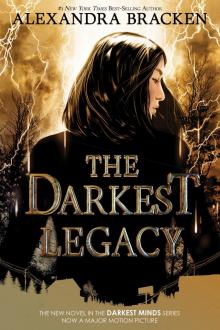 The Darkest Legacy
The Darkest Legacy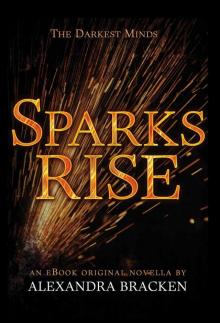 Sparks Rise
Sparks Rise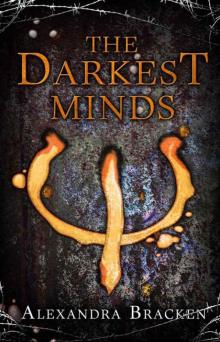 The Darkest Minds
The Darkest Minds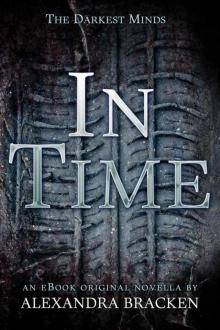 In Time
In Time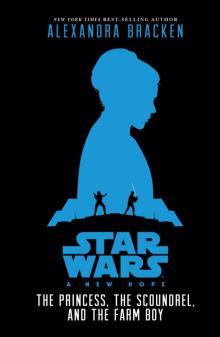 Star Wars: New Hope: The Princess, the Scoundrel, and the Farm Boy: Being the Story of Luke Skywalker, Darth Vader, and the Rise of the Rebellion (Novel)
Star Wars: New Hope: The Princess, the Scoundrel, and the Farm Boy: Being the Story of Luke Skywalker, Darth Vader, and the Rise of the Rebellion (Novel)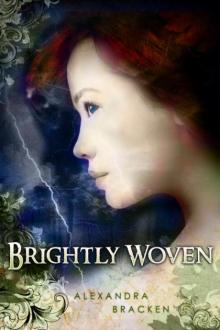 Brightly Woven
Brightly Woven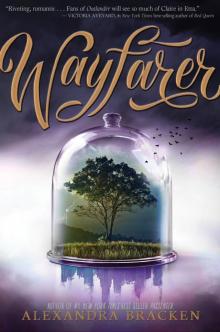 Wayfarer
Wayfarer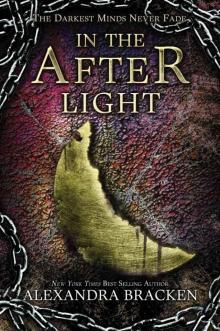 In the Afterlight
In the Afterlight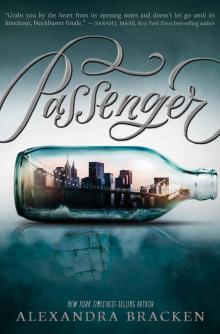 Passenger
Passenger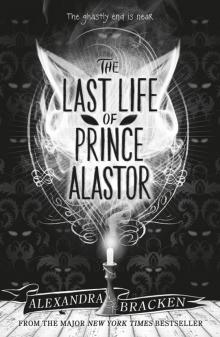 Prosper Redding: The Last Life of Prince Alastor
Prosper Redding: The Last Life of Prince Alastor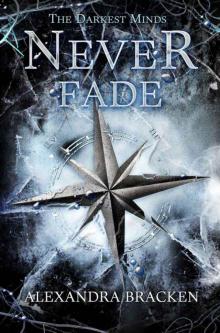 Never Fade
Never Fade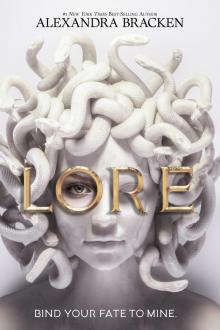 Lore
Lore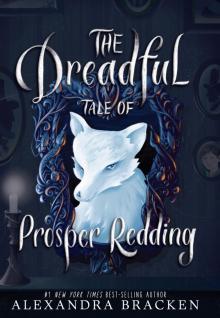 The Dreadful Tale of Prosper Redding
The Dreadful Tale of Prosper Redding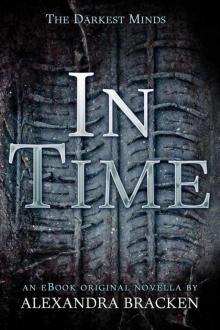 The Darkest Minds: In Time
The Darkest Minds: In Time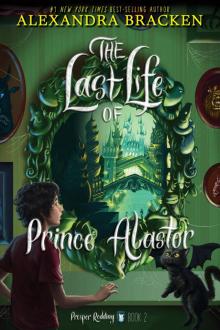 The Last Life of Prince Alastor
The Last Life of Prince Alastor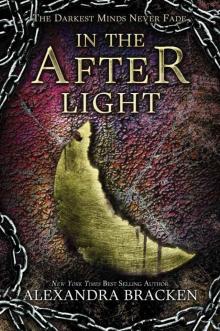 In the Afterlight (The Darkest Minds series)
In the Afterlight (The Darkest Minds series) In the Afterlight (Bonus Content)
In the Afterlight (Bonus Content)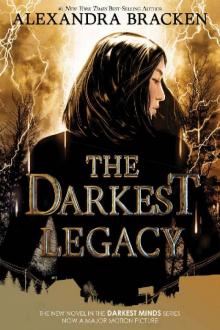 The Darkest Legacy (Darkest Minds Novel, A)
The Darkest Legacy (Darkest Minds Novel, A)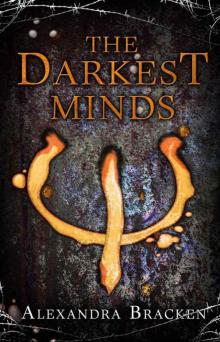 Darkest Minds (1) The Darkest Minds
Darkest Minds (1) The Darkest Minds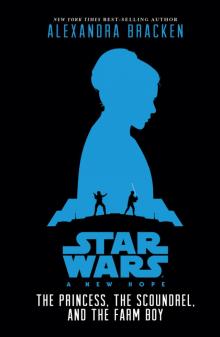 The Princess, the Scoundrel, and the Farm Boy
The Princess, the Scoundrel, and the Farm Boy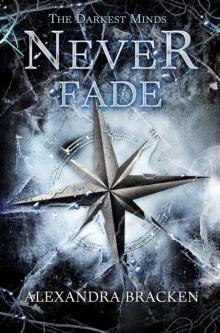 Never Fade tdm-2
Never Fade tdm-2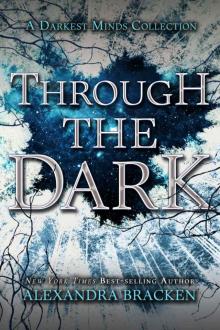 Through the Dark (A Darkest Minds Collection) (A Darkest Minds Novel)
Through the Dark (A Darkest Minds Collection) (A Darkest Minds Novel)